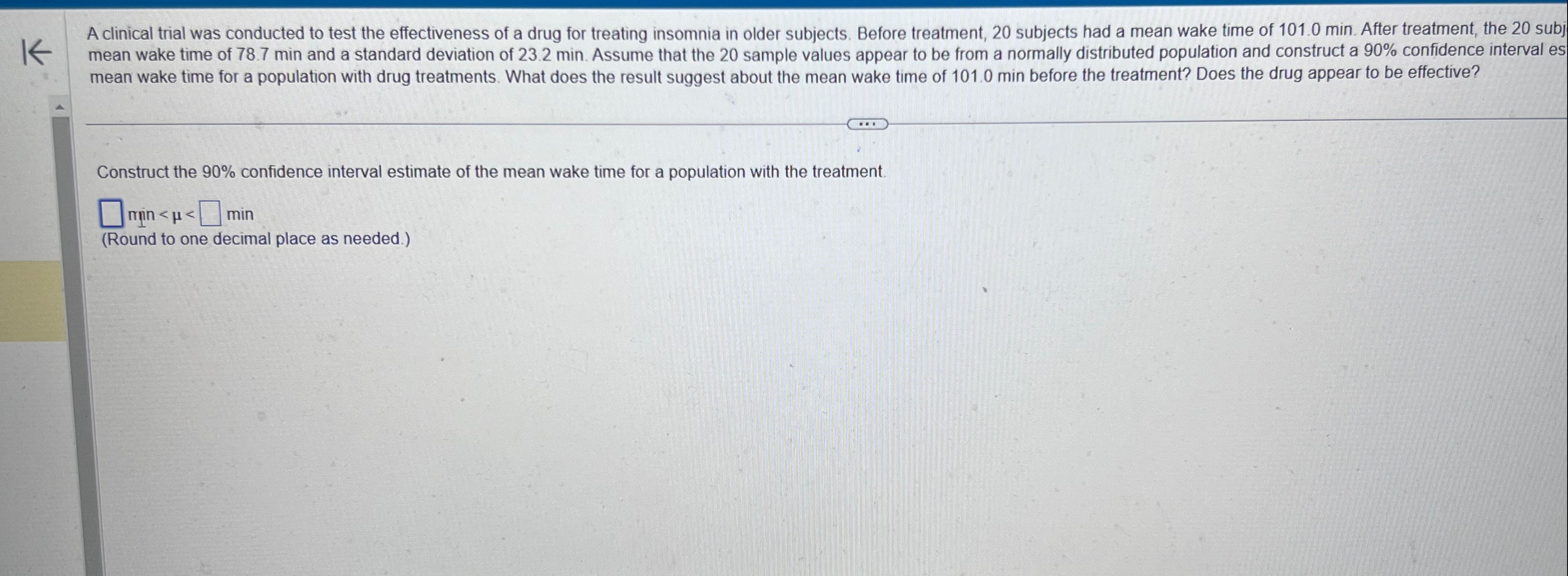AI tutor
Welcome to Bytelearn!
Let’s check out your problem:

A clinical trial was conducted to test the effectiveness of a drug for treating insomnia in older subjocts. Before treatment, subjects had a mean wake time of . min. After treatment, the suby mean wake tme of and a standard deviation of . Assume that the sample values appear to be from a normally distributed population and construct a confidence interval es mean wake time for a population with drug treatrents. What does the result suggest about the mean wake time of . min before the treatment? Does the drug appear to be eflective?Construct the confidence interval estimate of the mean wake time for a population with the treatment. \square \min <\mu<\square \min (Round to one docimal place as needed.)
Full solution
Q. A clinical trial was conducted to test the effectiveness of a drug for treating insomnia in older subjocts. Before treatment, subjects had a mean wake time of . min. After treatment, the suby mean wake tme of and a standard deviation of . Assume that the sample values appear to be from a normally distributed population and construct a confidence interval es mean wake time for a population with drug treatrents. What does the result suggest about the mean wake time of . min before the treatment? Does the drug appear to be eflective?Construct the confidence interval estimate of the mean wake time for a population with the treatment.(Round to one docimal place as needed.)
- Identify Parameters: Identify the sample mean (), the sample standard deviation (), and the sample size ().Sample mean () after treatment = minSample standard deviation () = minSample size () =
- Determine Confidence Level: Determine the appropriate z-score for the % confidence level. Since the sample size is small n < 30 and the population standard deviation is unknown, we should use the t-distribution. However, for a % confidence interval and a sample size of , the t-score is very close to the z-score. For simplicity, we will use the z-score for a % confidence interval, which is approximately . Note that for more accurate results, especially with small sample sizes, the t-score should be used.Z-score for % confidence =
- Calculate SEM: Calculate the standard error of the mean (SEM), which is the standard deviation of the sampling distribution of the sample mean.
- Calculate Margin of Error: Calculate the margin of error (ME) using the z-score and the standard error of the mean.
- Construct Confidence Interval: Construct the confidence interval by subtracting and adding the margin of error from the sample mean.Lower limit = Lower limit = Lower limit (rounded to one decimal place)Upper limit = Upper limit = Upper limit (rounded to one decimal place)
- Interpret Results: Interpret the confidence interval and compare it to the mean wake time before the treatment. The confidence interval for the mean wake time after treatment with the drug is between and . Since the interval does not include the mean wake time before treatment (), this suggests that the drug treatment has effectively reduced the mean wake time, indicating that the drug appears to be effective for treating insomnia.
More problems from Interpret confidence intervals for population means
QuestionGet tutor help
QuestionGet tutor help
QuestionGet tutor help
QuestionGet tutor help
QuestionGet tutor help
QuestionGet tutor help
QuestionGet tutor help
